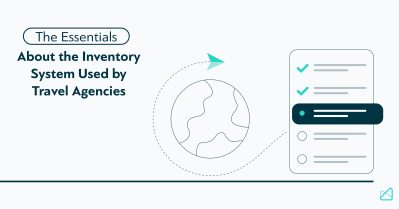6 Risks for a travel agency business and how to solve them

The role of travel agencies and tour operators in the tourism industry is clearly essential, but these kinds of businesses face a number of risks. Some of these risks apply generally to the retail and service industries and others are specific to the travel industry.
There are several challenges for a travel agency (or a travel host agency) to survive in the current environment. In this article, we identify some potential threats in the travel agency business and provide guidance on how you can protect your agency against them.
An example of a risk assessment for a travel agency
If you run your travel business from a store or office then you are legally required to carry out a regular risk assessment of your premises to make sure that you are taking reasonable steps to prevent your employees and customers from harm. In the US, the Occupational Safety and Health Administration looks after safety in the workplace. In the UK, it’s the Health and Safety Executive and they can provide you with an example of a risk assessment for a travel agency.
There are also some elements of insurance that a business is legally obliged to have, such as employer’s liability and commercial car insurance. Now is a good time to take a detailed look at your business insurance coverage.
Insurance companies provide standard commercial coverage against fire, flooding, theft and accidents. They are very unlikely to provide for business interruption due to a global pandemic, although it’s worth speaking to your insurance provider to explain your own circumstances and seek advice on the exact coverage of your policy.
Apart from the normal risks in travel agency business, it’s important that your business remains covered for standard risks, especially if your store or office is unoccupied for a period of time. In general, cyber insurance policies will include coverage for working from home too.
Challenges for a travel agency to survive in the current environment
There are several challenges for a travel agency or an online travel agency (OTAs) to survive in the current environment. These relate to your business reputation and duty of care, your ability to stay solvent and the extent to which you succeed in giving your customers what they want.
Travel agency problems
Crises tend to bring out the very best and worst behaviour from companies and the spread of Covid-19 has been no exception. Remember Britannia Hotels, the UK hotel group that not only made employees redundant on the spot but also homeless? After such widespread bad publicity, who would want to book or work with them?
Compare that with companies like Marriott International that are helping to fight the virus by offering free food and accommodation to nurses, doctors, and key workers. Obviously, you would prefer your business to be associated with the latter rather than the former!
Your reputation and duty of care
Reputation matters at all times. People will be writing about your company and the services you offer on a range of online platforms. It is essential that you track and respond to this feedback promptly and you may need reputation management software to help you do this.
Crises can make or break companies, but reputations are formed over the long-term. How you deal with cancellations and postponements will tell your customers what kind of company you are. It is important to communicate clearly and be consistent and transparent regarding your policies. You could also help them obtain the best and most appropriate travel insurance for their future needs.
Travel advisors owe a duty of care to their employees and the traveling public they serve, including a responsibility to provide all relevant and necessary information. Take a look at the code of ethics of the American Society of Travel Advisors as a reference.
Cashflow is crucial to your survival
Second, only to health, cash is the focus for all business owners right now. Current travel agency problems include the virtual absence of business travel and hence scarce ability to generate revenue from airline tickets at the moment.
Dealing with cancellations while maintaining revenue flow may seem like a tricky balancing act but it is a process that can help you find out more about your customers and their needs.
Singapore-based travel start-up Anywhr is encouraging its customers to plan far into the future. It is reportedly offering a 60% discount off its annual membership which gives users up to ten planned trips. The deal now costs $300 instead of $900 and healthcare workers get two years for the price of one. More than 500 new members have signed up so far.
Build-in financial resilience
In times of crisis, it is necessary to build financial resilience into your business model. You may be able to re-negotiate your rent and lower your expenditure on utilities. Keeping in touch with local professional organizations will help you understand whether you and your employees are entitled to government-sponsored financial aid.
If it does become necessary to reduce your labor overheads then Roger Block, president of Travel Leaders Network, has some valuable advice about making labor cuts while keeping your workforce motivated and on the side.
There are other areas where you should be investing in order to future-proof your operation. Optimizing your IT operations will give you a significant competitive edge by introducing new ideas and technologies. For example, Hotelmize has developed a unique profit optimization solution powered by AI that unlocks hidden profits from hotel bookings already made on your platform.
To date, Hotelmize has handled over $2b worth of reservations and generated more than $100m of extra profit for its customers, including many leaders of the global tourism industry.
Threats to the tourism industry
In September 2019, Thomas Cook, one of the world’s oldest and best-known travel operators collapsed with debts of $2b, putting thousands out of work. How could a business with a 178-year history fail so spectacularly?
Obviously, coronavirus had nothing to do with it. Rather, bad management, enormous debts and terrorism in North Africa and Egypt – key markets for the operator – were just some of the contributing factors.
But most damaging of all was Thomas Cook’s seeming reluctance or inability to change with the times. Whilst its rivals widened their offers to include weekend breaks or three-week holidays, Thomas Cook doggedly stuck to its package holidays of one or two-week duration only. It also clung onto its lossmaking high-street stores whilst online booking became the norm. If you are asking what is a booking system then you need to do some research.
Stay relevant in a competitive market
The demise of Thomas Cook gives us a valuable lesson about staying relevant in a highly competitive market and rapidly-changing world like the top online travel agencies do.
As a travel agency, your success will depend on keeping a laser-sharp focus on what your customers want. The way to stay relevant and avoid the mistakes made by Thomas Cook is to constantly stay agile, think creatively and be responsive to the needs of all types of travelers. Arguably this is easier to achieve if you are a small business. For more ideas, read our article on the future of tour operators.
Subscribe to
our newsletter
Yay! You are now
subscribed to our
newsletter
Mize is the leading hotel booking optimization solution in the world. With over 170 partners using our fintech products, Mize creates new extra profit for the hotel booking industry using its fully automated proprietary technology and has generated hundreds of millions of dollars in revenue across its suite of products for its partners. Mize was founded in 2016 with its headquarters in Tel Aviv and offices worldwide.
Related Posts

List of 32 travel agency management groups
6 min. Whether you are thinking of moving into the travel industry or you already own a business in this sector, the concept of travel agency management groups is a task worthy of analysis and study. Defining an effective business model for your retail travel agency is one of the key factors in optimizing sales […]

Ultimate Guide to Understanding the Benefits of a Travel Management Company
12 min. Managing and operating modern businesses often encompasses corporate travel. However, managing business travel is complex, especially with limited experience and resources. You must ensure that everything goes smoothly for the travelers while staying on top of the logistics and expenses. That’s why many organizations decide to outsource their travel management to a dependable […]

The Essentials About the Inventory System Used by Travel Agencies
11 min. While travel agencies have to overcome many challenges to remain competitive, there is one challenge in particular that all agencies need to overcome despite their size or target market. They need to excel as intermediaries between tour operators or travel product suppliers and consumers or travelers. The real question is, how do they […]
